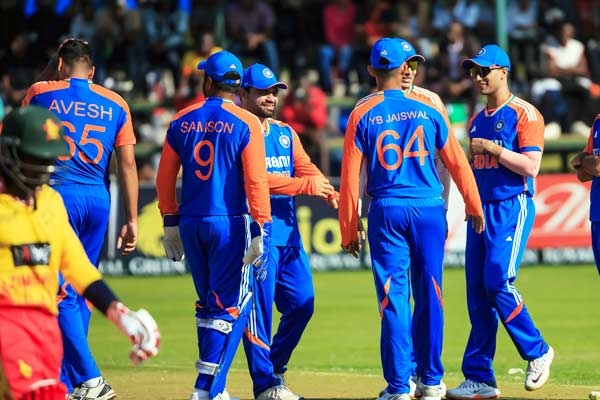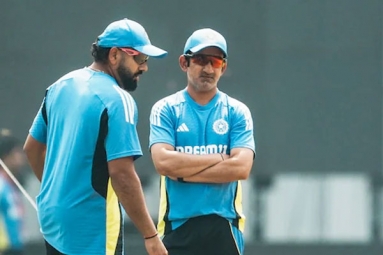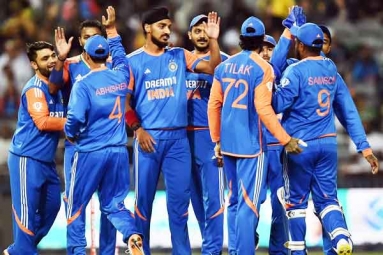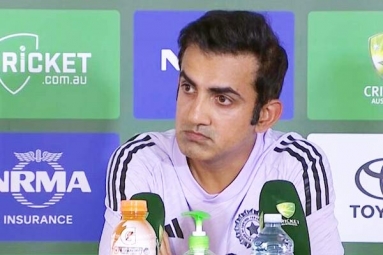
(Image source from: x.com/BCCI)
In the third T20I, India edged closer to securing the five-match series against Zimbabwe, clinching a 23-run to take a 2- lead. Gill's impressive 66-run knock off 49 series, alongside Jaiswal's brisk 36 from 27 balls, set the foundation for India's total of 182/4. Gaikwad's quickfire 49 from just 28 balls further bolstered the innings. Washington's three-wicket haul, including two in his opening over, stifled Zimbabwe's hopes of a comeback. Despite a valiant half-century from Dion Myers, his first in T20Is, and a 77-run partnership with Clive Madande, Zimbabwe couldn't prevent the inevitable. The return of three players from the T20 World Cup-winning squad prompted a tactical change for India, with Jaiswal and Gill forming the opening pair, while Abhishek Sharma and Gaikwad adjust different batting positions. India's innings started cautiously, with 29 runs scored in the first 2 overs. However, the pace and accuracy of Blessing Muzarabani and the guile of Sikandar Raza's spin made it difficult for the batters to score freely. India's run rate slowed, and they reached 67 for 0 after 8 overs. This brought about the dismissal of Jaiswal, who miscued a switch hit to the fielder at backward point.
Abhishek's brief stay at the crease followed by the partnership between Gill and Gaikwad in the 11th over. Wessly Madhevere's over in the 13th over allowed India to change gears, with Gill and Gaikwad hitting a six and a four off the leg spinner. Gaikwad demonstrated his ability to use his feet against pace, successfully disrupting the rhythm of Tendai Chatara and Richard Ngarava. Gill also accelerated, reaching a 36-ball fifty, his first as India's T20I captain. Despite a batting order, India were in danger of posting a below-par score, as they were 130 for 2 after 16 overs.The batters showcased their prowess, earning four byes and a six each, propelling the team's score. However, the uneven pitch posed a challenge, as Gill's attempt to clear the boundary in the 18th over was thwarted, leading to his dismissal. Gaikwad's aggressive innings fell just short of a half-century, but his powerful strikes left an impression.
India's batting effort was more than satisfactory, as they posted a respectable total of 182 runs. Two productive half-century partnerships, one between Gill anaiswal (67 off 50 balls) and the between Gill and Gaikwad (72 off 44 balls), played a crucial role in propelling the team's score. Jaiswal, at the end of the innings, felt that the total was sufficient. Their success was partly attributed to Zimbabwe's missed opportunities, including two dropped catches - one each of Jaiswal and Gaikwad - and several fielding lapses. In the opening over, Chatara's inability to reach Jaiswal's pull shot foreshadowed the challenges Zimbabwe would face on the field. In the next over, Myers was slightly late in reacting to a top edge from Gill, allowing the ball to fall short of him. Jaiswal and Gaikwad both benefited from these reprieves. Although India faced 22 dot balls during the powerplay, the team's momentum was not hindered, as they ultimately gained an advantage of 31 runs due to the mishaps on the field. The final victory margin was a mere 23 runs. Tadiwanashe Marumani replaced Innocent Kaia, who had a split webbing, at the top of the order and made an enterprising start.
Khal Ahmed, filling in for Mukesh Kumar, managed to take a wicket but struggled to replicate that success in his next over. Avesh Khan then dismissed Madhevere, who hit a short ball to the fielder, and Brian Bennett, thanks to a spectacular catch from Ravi Bishnoi. When Raza was caught deep in the deep by Washington's delivery, it seemed like Zimbabwe's demise was imminent. The impression only strengthened when substitute fielder Riyan Parag took a sharp catch at slip to dismiss Johnathan Campbell shortly after. However, Myers and Madonna had different plans. India's decision to include all their T20 World Cup returnees left them with limited bowling options, forcing Abhishek and Shivam Dube to bowl four overs. Myers and Ma capitalized on this, hitting a combined six fours and two sixes off the pair. Despite the early setbacks, Zimbabwe managed to 50 runs in those four overs, keeping the match within reach.






















